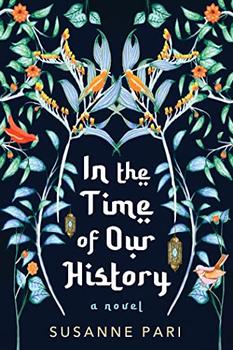Summary | Excerpt | Reading Guide | Reviews | Beyond the Book | Readalikes | Genres & Themes | Author Bio

PROLOGUE
As a matter of coincidence, the American Embassy hostages were released on the same day that Mitra Jahani had her tubes tied. January 20, 1981. She saw the men on a wall-mounted television screen when she woke up from the surgery. The volume was low, but she heard their hoots and hollers, saw one punch the air in triumph, another one kiss the tarmac at the bottom of the mobile stairs. Fifty-two of them, long-haired and bearded, looking fairly decent for having spent more than a year in the clutches of a group of young Iranian militants. Either I'm still zoned out and dreaming, Mitra thought, or I'm hallucinating.
Mitra closed her eyes, counted to five, opened them tentatively, and kept her gaze away from the television screen. Here was the top of her hand, covered in a mess of clear tape, sprouting a needle and IV tubing that snaked beyond her peripheral vision. Here was her body covered in a flimsy white hospital blanket, her big feet down there like two molehills. Her other hand, she realized, rested under the blanket on a thick strip of gauzy bandage taped to her lower belly. She turned her head slightly, and here was Olga, sitting next to her like Luca Brasi on a job for the Corleone family.
The caption on the TV screen read: RHEIN-MAIN AIR FORCE BASE, GERMANY. With an oversize smile, President Jimmy Carter—actually, former President by just a few minutes—was greeting the hostages for whom his administration had finally negotiated a release.
"This is surreal," Mitra muttered.
Olga bolted up from her chair and bent forward. "What you say, Mitra-joon?"
Mitra pointed weakly at the TV, coughed, then winced. Amazing how many stomach muscles were involved in a simple cough.
"You have pain," Olga pronounced anxiously in Farsi. She hurried into the hallway, her rubber-soled orthotics squeaking on the linoleum. "'Scuse me, 'scuse me! I need nurse here. My girl, she need medicine for pain. You coming now? Now you coming? Please. Right 'way, please! Oh, t'ank you, t'ank you." A pill came to Mitra in a plastic cup. Olga's thick dishpan fingers tilted a glass of water to her lips. She swallowed and let her head fall back against the pillow.
Now the caption read: HOSTAGES RETURN AFTER 444 DAYS IN CAPTIVITY. Okay, she wasn't hallucinating.
"Number four very bad luck," said a voice to Mitra's left. A Chinese woman in the other bed was shaking her head at the screen. "Four-four-four. Triple bad luck."
"Ignore her," said Olga in Farsi. "Bad luck is more complicated than one number. Anyway, she is nosy, asking why a young girl such as you had a woman's surgery. She thinks you had an abortion, and she wants to disapprove. You should have a private room."
Mitra smiled thinly at the woman. To Olga, she shrugged and responded in Farsi, "It's only one night." She gestured at the television. "Why aren't you joyful, Olga-joon? No more yellow ribbons or 'Bomb Iran' songs." Mitra thought people would slowly forget the whole miserable crisis. Maybe they'd even revert to thinking of Iran as Persia, an exoticized place whose inhabitants lived in silk tents and rode camels. To think that such ignorance had once pissed her off, that she'd tried to correct people about where her parents originally came from, even to show them a map sometimes. She never thought she'd want that back again, that anonymous heritage.
Olga said, "I do not care anymore about the hostages or the new President Reagan or Iran, may God castrate its mullahs. I am worrying about you, Mitra-joon. How you are and what you have done." She looked away. "How I have helped you do this terrible thing."
Olga knew about operations. Eleven times in her youth she had let the surgeons cut her. Operations to "correct" her. Of no use. She remained infertile. This was what happened when girls were married off at twelve and pregnant by thirteen. A body too small to nurture another body. Death before life. A full-grown baby boy—gray as a dead tree—cut out of her like a useless goiter. The look of her bloated belly still told the story: the first cut—from breast to mound—like a river on a map; the other cuts like silvery moonlit tributaries.
Excerpted from In the Time of Our History by Susanne Pari. Copyright © 2023 by Susanne Pari. Excerpted by permission of Kensington Publishing. All rights reserved. No part of this excerpt may be reproduced or reprinted without permission in writing from the publisher.
Common sense is genius dressed in its working clothes.
Click Here to find out who said this, as well as discovering other famous literary quotes!
Your guide toexceptional books
BookBrowse seeks out and recommends the best in contemporary fiction and nonfiction—books that not only engage and entertain but also deepen our understanding of ourselves and the world around us.